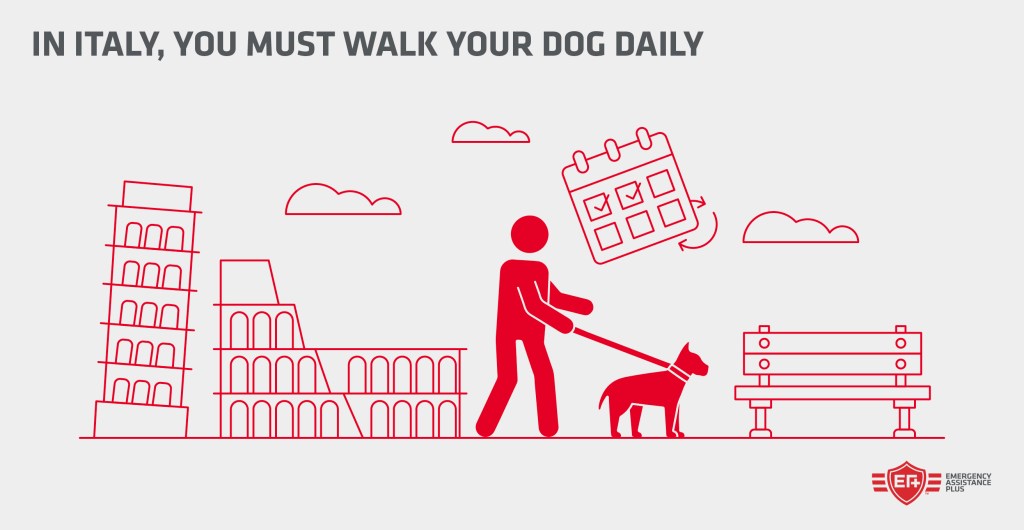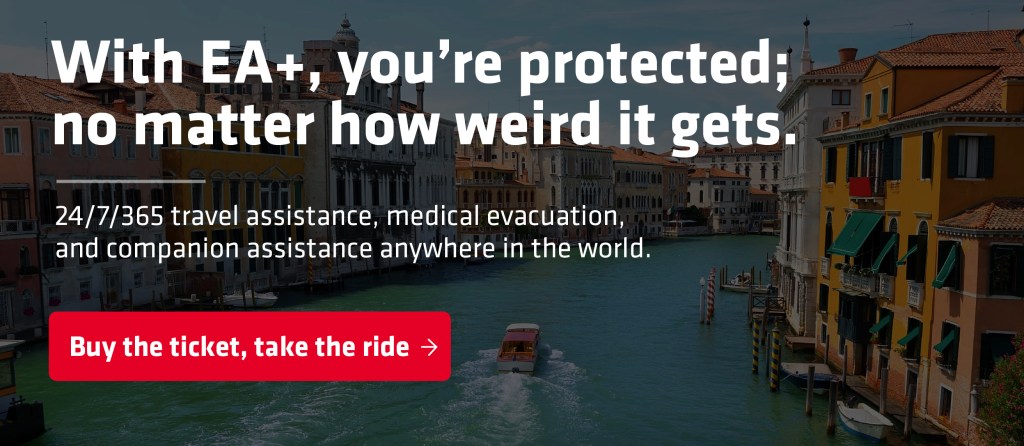Travel Tips
Uncover 25 of the weirdest laws from around the world, from outlawed chewing gum in Singapore to high heel bans in Greece.
The world is a fascinating place…
As a travel assistance provider, our team has heard stories from all over the globe; funny, sad, heart-warming, and everything in between.
Today, we want to share some of the most unusual laws in the world. As you’ll see, many of them have valid and specific reasons for their existence, but they certainly do standout nonetheless!
Note: We intend this article to be educational and entertaining, with no offense directed at any of the locations mentioned. This is not legal advice.
As always, we recommend studying your intended destination prior to your travels so you can get a sense of the local customs. With that said, enjoy these 25 quirky laws from around the world.

Since 1992, chewing gum has been banned in Singapore to keep public spaces clean.
Exceptions are made for therapeutic purposes, but in general, selling, buying, and using chewing gum is illegal.
In Greece, wearing high heels at ancient sites like the Acropolis is prohibited to prevent damage to historical monuments. The intent of the law seems justified, but just make sure to pack some sandals if you plan to tour historical sites.
Western Australia had a law limiting how many potatoes an individual can possess until very recently. It stemmed from a controversial effort to control the potato market via the Marketing of Potatoes Act of 1946.

In Turin, Italy, it’s illegal to not walk your dog at least once a day. Violators can face fines up to 500 euros. There are also regulations around dying a dog’s fur.
In Milan, there’s a law that requires citizens to smile at all times, except during funerals or hospital visits. It’s a very old law that has never been technically repealed, and—not surprisingly—is not strictly enforced.
Still, make sure to smile for your photos in Milan!
In Sri Lanka, it’s illegal to take selfies with your back turned to Buddha statues, as it’s considered disrespectful. The offense is actually not the act of taking the photo, but rather turning your back on Buddha; spiritually or physically, apparently.
Japan has a “Metabo Law” that requires men and women between the ages of 40 and 74 to have their waistlines measured every year and “…may be required to go to counseling sessions or converse with a health expert about dietary options.”
In Poland, Winnie the Pooh is banned from playgrounds and schools because he doesn’t wear pants. The issue was discussed during a local council meeting, and the audio was subsequently leaked to the Croatian Times newspaper.

To preserve the city’s monuments, Venice has a law against feeding pigeons in public squares, particularly in St. Mark’s Square. Additionally, vendors are not allowed to sell grain to tourists in certain areas where feeding would attract additional pigeons, including their bird poop.
Sweden has strict laws regarding baby names, and names like “Elvis” and “Metallica” are forbidden. Under Sweden’s “Naming Law,” which controls the types of first names allowed for babies, names like Ikea, Veranda, Superman, Elvis, and Brfxxccxxmnpcccclllmmnprxvclmnckssqlbb11116 have been rejected.
Canadian law limits how many coins can be used in a transaction: 25 loonies ($1 coins) is the maximum. Canada’s Currency Act sets certain limits on how many coins can be used when buying goods. In one transaction, you’re allowed to use up to 25 pennies, 100 nickels, 100 dimes, 40 quarters, 25 loonies, and 20 toonies.
“Loonies” are $1 coins and “Toonies” are $2 coins, by the way.
In this town, burying bodies is prohibited because the ground is too cold to allow bodies to decompose. Dying individuals must be sent to mainland Norway.
If you’re looking for more information about transporting human remains internationally, click here.
Wearing camouflage clothing is illegal in several Caribbean countries to prevent confusion with military personnel.
In fact, the Royal Caribbean cruise line has special protocols to remind passengers that it’s illegal in some destinations.
In this French village, it’s illegal to die unless you’ve already purchased a burial plot due to running out of space. This line from the NPR coverage is worth a read:
“Reuters news agency reports that a sentence added, offenders will be severely punished. Well obviously not with the death penalty. So how do you punish postmortem Frenchmen in Bordeaux? Maybe by serving a California merlot at their funeral, wherever that is.”
Following an incident where naked hikers shocked locals, a local authority in Switzerland fined these hikers for hiking in the nude. While Switzerland doesn’t have a specific law prohibiting public nudity, it does have regulations against public indecency.
Under the Salmon Act of 1986, it’s illegal to handle salmon “suspiciously,” though the exact meaning of this remains unclear.
In Scotland, if someone knocks on your door and asks to use the bathroom, you are legally required to let them in. The actual law (which is enforceable) stems from an extension of the old Scottish common law that requires hospitality to be shown to guests.
It’s illegal to leave your house in Thailand without wearing underwear, though this law is rarely enforced.
In Scotland, riding a cow under the influence of alcohol is illegal under the Licensing Act of 1872. Those found guilty could be jailed for up to 51 weeks.

In Vermont, women must get written permission from their husbands before getting false teeth.
Denmark has a list of 7,000 pre-approved baby names, and parents must choose from this list or get approval from the government. If you wish to give your child a name that isn’t on the approved list, you’ll need to seek special approval from your local church, and the name will be reviewed by government officials. Unconventional spellings of common names are frequently turned down.
French law permits posthumous marriages, provided there’s proof that the deceased had planned to marry before their death.
In Alabama, wearing a fake mustache in church is illegal if it causes laughter.
Driving a dirty car in Russia can get you fined, as cleanliness is associated with public respect. You may be fined up to 2,000 roubles.
In the United Arab Emirates, using foul language in public, including on social media, is illegal and can lead to fines or imprisonment.
As you can see, the world is full of quirky rules and surprising laws, making travel all the more interesting.
But no matter where your adventures take you, it’s always good to be prepared. That’s where Emergency Assistance Plus (EA+) comes in. Whether you find yourself needing help with a sticky situation, require translation assistance, or just have a question while abroad, EA+ has your back.
Just call the number on your card, and you’ll have access to a wide range of travel assistance services to help keep things running smoothly. Safe travels—and remember, always check the local laws before you pack!
